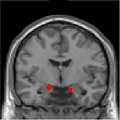Science Updates About Military Service Members
- Study Shows REACH VET Program Effective for Veterans at High Risk for Suicide
-
A recent NIMH co-authored study shows that a Department of Veterans Affairs suicide prevention program was associated with fewer inpatient mental health admissions and emergency department visits, and a 5 percent reduction in documented suicide attempts.
- Brain Biomarkers Could Help Identify Those at Risk of Severe PTSD
-
This study has shed light on the neurocomputational contributions to the development of post-traumatic stress disorder in combat veterans, finding distinct patterns for how the brain and body respond to learning danger and safety depending on the severity of PTSD symptoms.
- A Shorter—but Effective—Treatment for PTSD
-
Research supported by the National Institute of Mental Health has shown that a shorter therapy (written exposure therapy) may be just as effective as lengthier first-line treatments for PTSD.
- Attention-Control Video Game Curbs Combat Vets’ PTSD Symptoms
-
A video game that implicitly taught combat vets that threatening stimuli are irrelevant to performing their task reduced their PTSD symptoms.
- Study May Help Department of Veterans Affairs Find Patients with High Risk of Suicide
-
Scientists used health data to identify very small groups of VHA patients with very high, predicted suicide risk. Such methods can help the VHA to target suicide prevention efforts for patients at high risk, and may have more wide-ranging benefits.





